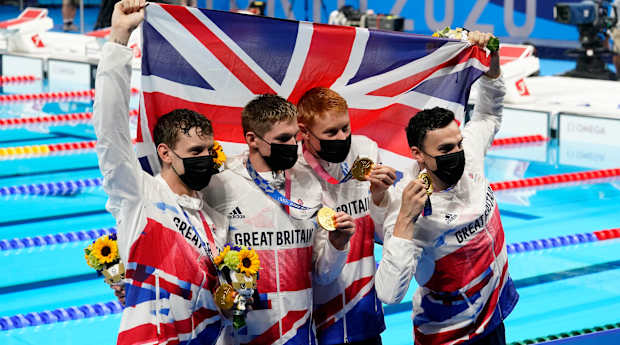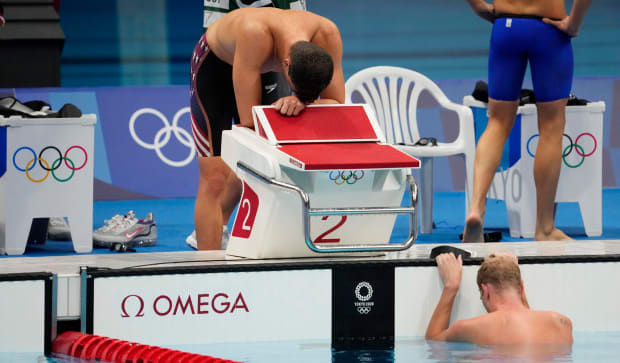A decision to the leave the star swimmer off the 4 x 200-meter freestyle relay team resulted in a shocking podium miss for the U.S., as Great Britain captured the gold.
Sign up for our free daily Olympics newsletter:
Very Olympic Today. You'll catch up on the top stories, smaller events, things you may have missed while you were sleeping and links to the best writing from SI’s reporters on the ground in Tokyo.TOKYO — Relay decisions for swim coaches are like pitching changes for baseball managers. It doesn’t matter how much thought goes into it beforehand, the results will dictate the reaction.
“When it goes well you look like you know what you’re doing,” says U.S. men’s Olympic coach Dave Durden. “When it doesn’t go well, you look like you don’t know what you’re doing at all.”
It didn’t go well for the U.S. Wednesday morning, with its 4 x 200-meter freestyle relay finishing fourth—the first relay podium miss in Olympic history for the U.S., men or women, a staggering run of success. Thus, Durden found himself facing the firing squad.
It only consisted of two reporters in person, but none other than Michael Phelps had made his thoughts clear on NBC and a nation of armchair swimming experts were chiming in as well. Everyone wanted to know about one key decision: why wasn’t the best U.S. male swimmer, Caeleb Dressel, part of the lineup?
Phelps called the decision “shocking,” saying, “In my opinion he’s probably the best 200 freestyler in the world. Leaving him off that relay makes it a lot harder to win.”

In reality, the U.S. was never going to win that relay. Great Britain dominated as expected, breezing to victory by more than three seconds and missing both the Olympic and world records by mere hundredths. The race was for second and third, and everyone knew coming in that the Americans would be hard-pressed to get a medal at all. The struggle was real and obvious coming into the Olympics.
But a silver (which went to Russia) or bronze (Australia) certainly would have been in play with one more quality relay leg than the American quartet of Kieran Smith, Drew Kibler, Zach Apple and Townley Haas delivered. Dressel could have been that guy. And he wanted to be that guy, swimming the 200 in preliminaries at Olympic Trials specifically to post a time worthy of inclusion.
At 1:46.63, with the potential for significantly faster, it was definitely worthy. Still, the American coaching staff opted not to use him. (It should be known that the staff includes Dressel’s coach at Gator Swim Club, Gregg Troy. He certainly contributed to the discussion.)
Durden indicated that this was a long play, designed to save Dressel’s energy for his backloaded race schedule in the coming days. With one gold medal in the pocket from the 4 x 100-meter freestyle relay, Dressel still has the final of the 100-meter freestyle, three rounds of the 50-meter freestyle and 100-meter butterfly, a spot on the medley relay and possibly one on the mixed medley.
Implicit in that decision was an acknowledgment that the 4 x 200-meter freestyle relay was a race for silver at best, whereas the other relays could be for gold. That includes the desire to maintain America’s forever streak of Olympic relay gold in the men’s medley.
“We spend a lot of time chatting about this, looking at schedules, seeing how it’s going to impact the current session, later days, what’s coming up,” Durden said. “As we flipped this thing upside down, right side, sideways, we just felt like it was best for Team USA, the men’s team, for Caeleb, to put us in position to win the most medals throughout this meet, that it was best not to have Caeleb on the relay.”
The U.S. would have been asking Dressel to swim twice in the Wednesday morning session, the 100-meter freestyle semifinals (where he qualified second) and then the relay. Instead, they had Apple perform that double and neither were successful.

Apple missed the eight-man final in the 100-meter freestyle, and by then it was too late to change the relay lineup. After a blazing start, he cracked in the final 50 of his 200 leg. His last lap was 29 seconds flat, about 1.5 seconds slower than everyone else on the American quartet, and his total time of 1:47.31 was by far the slowest. In that time the U.S. faded from second to fifth, and Haas could only move the group back up one spot in the anchor leg.
In the end, the Americans was less than a second behind silver and bronze. Dressel almost certainly could have been the difference maker there—but not many people were doubting the presence of Apple before the event.
He’s been steadily developing a reputation for big relay performances. He swam some huge legs for the U.S. in international competitions in 2018 and ’19, and was heroic in anchoring the gold medal 400 relay earlier this week.
“We just felt like, O.K., that’s clicking,” Durden said of Apple. “It doesn’t change who Zach is as a s swimmer. That guy is rock solid. He just had a bad swim, and that is going to happen—we all have bad swims here or there. I’ve seen him bounce back … and come back better. As we look at the back of this meet, we need him to be better as we go through this.”
Indeed, Apple remains the most likely anchor swimmer on the medley relay and could be used in the mixed medley as well. His role figures to be far from over.
Not only does Apple need to bounce back, so does the rest of the American contingent. Although the U.S. women picked up four medals in their final two events Wednesday morning—silver and bronze in the 200 individual medley, gold and silver in the 1,500—the Americans have shown broad-based vulnerability in a sport where dominance is not just expected but demanded.
Durden said the team already has commenced the process of bouncing back from this historical shock to the system. “It came from our captains before I could even get to it,” he said. “That is indicative of our team—that message is already out.”
More Olympics Coverage:
• The USWNT's Off-Brand Olympics
• Sue Bird Seeks Historic Fifth Olympic Gold Medal in Tokyo
• Fencing’s Rich History With the Grisly—But Dignified!—Art of Dueling
• Biles, Osaka Signal New Era of Prioritizing Mental Health
No comments:
Post a Comment